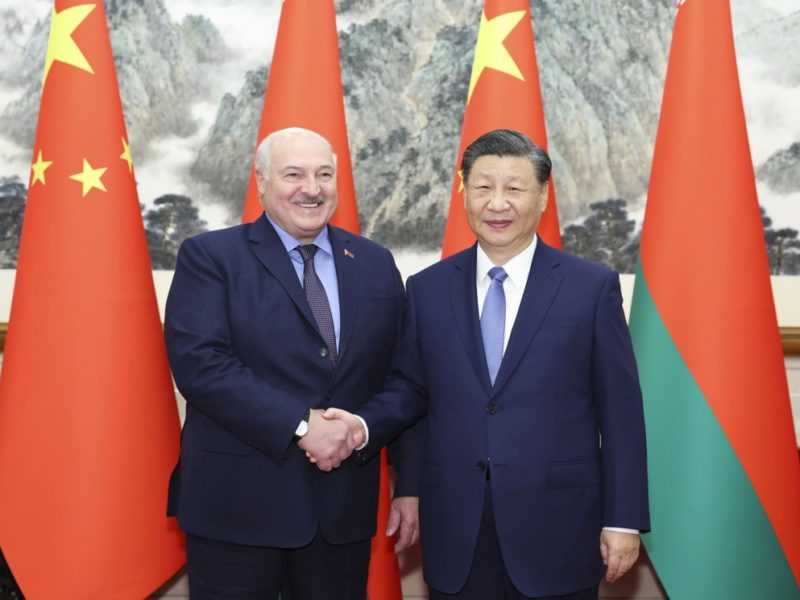“Corrosive capital” – financing that lacks transparency, accountability, and market orientation flowing from authoritarian regimes into new and transitioning democracies. It applies directly to big authoritarian countries which play a key role in Central Asia. Major economies such as Russia and China lack true forms of transparency, accountability, good governance in their foreign aid and capital granting schemes. It exploits and exaggerates governance gaps to influence economic, political, and social developments in recipient countries. The corrosive capital is understood as an influx of money that exploits weaknesses in governance and risks amplifying them, with the result of large agreements that are not well-documented, ending with countries losing ownership of key resources to their donor.
China deploys corrosive capital into these societies and the lack of transparency does real damage to accountability of institutions, good governance and breaks on public sector reform efforts. These practices not only affect Central Asia, but ripple in the Western Balkans, Eastern Europe and Africa as well. Tena Prelec analyzed that those non-transparent investments of China are often advanced through using informal political links or close relationship between top actors, bypassing competition rules and public procurement procedures; legislative changes introduced to favor investors and the political cultures underpinning these linkages are significant. The Belt and Road Initiative is coming to the participating countries with limited transparency and weak governance standards that could facilitate corruption and fraud around its projects. TI’s Corruption Perception Index indicates that countries along the initiative among the most corrupt countries in the world. Many countries that have taken Chinese loans are now reconsidering their deals with China due to allegations of corruption and low transparency.
A significant amount of capital influx comes to the region without an oversight and transparency on the funds, ruling kleptocratic elite will consider it as a new source of rent – illicit practices in the political system actively practices and China’s BRI will both create challenges to advance good governance and curbing corruption. In this light, advancing good governance and curbing corruption is a challenging task for Tajikistan. Tajikistan is a country whose ruling elite have historically shown skill in capturing state resources in corrupt schemes. This presents a danger that any investment or aid coming to the country will ultimately benefit the ruling elite.
Corruption is a result of the confluence of a weak state and powerful criminal networks that mix illicit with licit activities with state and non-state actors. Only privileged groups can not only participate in and enrich themselves through corrupt practices, but also through legal and semi-legal activities (including lobbying). These groups traditionally consist of the country’ president, the family of the president and their associates.
In April 2019 during the second Belt and Road Forum, Xi Zinping vowed “zero tolerance” for corruption, pledged more transparency, good environmental practices and expressed the commitment of China to open up. and that the cooperation within BRI initiative “will be open, green and clean”. Cooperation within the BRI “will be open, green and clean”, he said.
One of the elements of traditional Chinese social fabric is Guanxi, which to be used for achieving political goals. Guanxi is translated as corruption, a bribe (facilitation payment) or nepotism. It provides an exclusive access to resources and operates through informal connections. The Tajik equivalent would be Taghabazi, using once (uncle) relative or friend as a connection to reach political goals. Guanxi and local Central Asian traditions of graft creates a perfect opportunity for more corruption but less governance and integrity.
Tajikistan is a source of copper, zinc, titanium, aluminum, gold, pig iron, radioactive isotopes and other mining metals and stones – all needed for Chinese economy. China prioritizes building hard infrastructure, which China believes will catalyze the improvement of investment climate, good governance and human skills. However Chinese firms engaged in BRI lack transparency on contract negotiation, lack corporate social responsibility, have a low degree of respect for environment and governance laws. The socio-economic impact of the Chinese BRI is minimal since China employs mostly Chinese citizens in infrastructure and other projects.
Beijing provided a state loan of $280 millions to Tajikistan to renovate Dushanbe-Chanak Highway connecting Tajikistan capital city Dushanbe with Uzbekistan border city of Chanak. This project was completed in 2010 by China Road and Bridge Corporation. However, when the project was completed, the Dushanbe elite thought it could be used in a scheme and soon the highway transformed into toll road to be run by unknown company Innovative Road Solutions. This company has no corporate history, no prior experience in running highway projects and was registered in British Virgin Island, effectively becoming an offshore company located in a hyper secret tax haven. According to reporting from Deutsche Welle, it was traced to be belonged to Mr. Jamoliddin Nuraliev, the Son-in-Law of the President of Tajikistan. Furthermore, the company was exempted from dozens of taxes.
Apparently, the contribution to Deutsche Welle paper was made by Journalist from Tajikistan Mr. Khayrullo Mirsaidov, who later ended up in prison. It is most definitely linked with this publication, which is sensitive to Tajikistan’s ruling elite. Chinese business and individuals have a “cover” in Tajikistan, when a violation occurred by that can be traced to Chinese individuals, it usually gets covered up. This is one example of how BRI offered a rent-seeking opportunity to connected insiders and the local elite. It will likely continue to provide incentives to engage in illicit income. According to Tajik economist, annual revenue of this toll road will be $49 million.
When China provides loans, in addition to repaying the principal and the accrued interest, the main precondition is involving Chinese companies in the implementation of projects such as debt financed infrastructure projects that provide short-term employment, create some growth abroad, unload industrial overcapacity and cement influence and ownership of assets. There is a clause in case of defaulting the repayment of the loan, greater control over assets will be transferred to China. China uses resource backed model where a loan for infrastructure is to be repaid in the form of exports of agreed natural resource over time. There is a speculation that the Tajikistan ceded its territory in Pamir region (about 1,137 sq. km) in 2011 due to its inability payment of the loan taken for renovation of Dushanbe-Chanak highway.
Khojimuhammad Umarov argues that why Chinese business is more active in mining and gold extraction in Tajikistan due to their knowledge about “Game rules” in this industry. He states that in China is domestically for transparency and accountability, but abroad in Tajikistan they are expanding business using corrupt means, as Maria Adele Carai coins “adaptive governance.” Bribing including payment to foreign government officials and officials of international public organizations is considered a criminal offence in China, however anti-corruption laws implementation outside of China is far from perfect.
They don’t listen to World Bank Doing Business rating, they just take risks and do and work with local people, fixers and senior government officials. Jacob Mardell observed while travelling to Tajikistan in 2019 an arising group of fixers – lawyers who help Chinese individuals and businesses and play as an intermediate between China and Tajik government. According to one of the fixers, “as a foreigner you need a krysha (roof) to work in Tajikistan – a local can protect you”, Chinese people work with local people, they know how to work – who to bribe – whom to make connections.
To fight with corrosive capital will not be an easy task for a developing state like Tajikistan. It will have to improve the quality of institutions and ensure the rule of law, improve governance. It will be especially challenging when the sole donor of infrastructure investment is not the traditional donor who provides aid on conditionality of good governance reform.
In Tajikistan it’s necessary to scrutinize the BRI loan and credit projects to assess possible risks, governance and ecological impact and minimize corruption, these funds should be returned eventually. Public discussion about equality, justice, governance and equal business opportunities should be hold beneficial not only for Tajikistan future but for China’s BRI trust, image and legitimacy. More professional civil servants with mortal integrity are needed to fight against corrosive capital. Civil society activists need to strengthen their oversight on investment and aid implementation. Civil society in Tajikistan was significantly circumscribed. For building huge infrastructure objects, the country should have a greater regulation, transparency, law enforcement, integrity of elect officials and member of the parliament, and civic activism so collectively can overcome the negative externalities caused by adaptive governance approach promoted by China

Umedjon Majidi – Author of the blog series, Expert/Research Consultant, Civic IDEA




